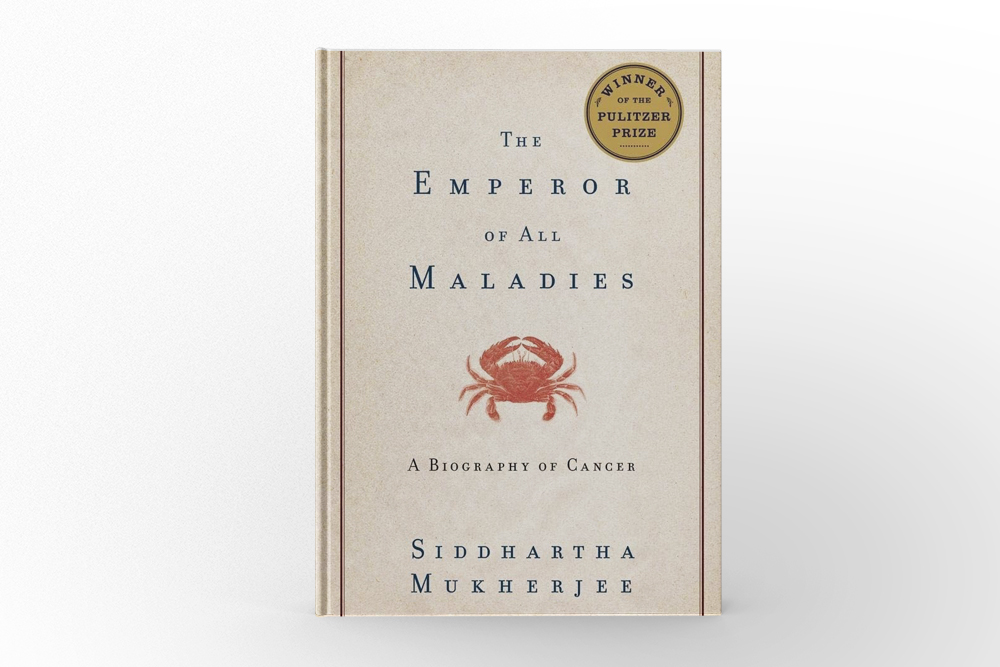“The Emperor of All Maladies” by Siddhartha Mukherjee is a monumental biography of cancer, tracing its history from ancient times to the modern era. This Pulitzer Prize-winning book offers a comprehensive and deeply humanized account of the disease that has affected countless lives.
Author’s Background
Siddhartha Mukherjee is an Indian-American physician, oncologist, and author. Born in New Delhi, India, Mukherjee pursued his education at Stanford University, the University of Oxford as a Rhodes Scholar, and Harvard Medical School. His extensive background in medicine and oncology, combined with his literary talent, makes him uniquely qualified to write about the history and science of cancer.
In Depth Summary
“The Emperor of All Maladies” is structured as a biography of cancer, providing a detailed and chronological account of the disease’s history. Mukherjee begins with the earliest known descriptions of cancer in ancient Egypt and Greece, highlighting how the understanding and treatment of the disease have evolved over millennia.
The book delves into the significant milestones in cancer research and treatment, such as the development of radical surgery by William Halsted in the late 19th century and the advent of chemotherapy in the mid-20th century. Mukherjee provides vivid descriptions of the scientists, doctors, and patients who played pivotal roles in these advancements, bringing their stories to life with empathy and detail.
One of the most compelling sections of the book is Mukherjee’s exploration of the “war on cancer” declared by President Richard Nixon in 1971. He examines the successes and failures of this ambitious initiative, shedding light on the complexities and challenges of cancer research. Mukherjee also discusses the rise of targeted therapies and the promise of personalized medicine, offering hope for more effective and less toxic treatments.
Throughout the book, Mukherjee interweaves his personal experiences as an oncologist, sharing poignant stories of his patients and their battles with cancer. These narratives provide a human face to the scientific and historical content, making the book both informative and emotionally resonant.
Themes and Insights
“The Emperor of All Maladies” addresses several profound themes. One of the central themes is the relentless nature of cancer and the ongoing struggle to understand and combat it. Mukherjee portrays cancer as a formidable adversary, constantly evolving and adapting to evade treatment.
Another significant theme is the intersection of science and humanity. Mukherjee emphasizes the importance of empathy and compassion in the practice of medicine, highlighting the need to balance scientific rigor with a deep understanding of the human experience. He also explores the ethical dilemmas and moral responsibilities faced by those working in the field of oncology.
The book also delves into the concept of hope and resilience. Despite the many setbacks and challenges in the fight against cancer, Mukherjee’s narrative is infused with a sense of optimism and determination. He celebrates the progress that has been made and the potential for future breakthroughs, inspiring readers to believe in the possibility of a cure.
Personal Reflections
Reading “The Emperor of All Maladies” is a deeply moving and enlightening experience. Mukherjee’s eloquent prose and meticulous research make the reader feel intimately connected to the history and science of cancer. The book prompts readers to reflect on their own experiences with the disease, whether as patients, caregivers, or loved ones.
Mukherjee’s personal reflections as an oncologist add a layer of authenticity and vulnerability to the narrative. His honesty about the emotional and ethical challenges he faces in his work resonates deeply, reminding readers of the human side of medicine.
Recommendation
“The Emperor of All Maladies” is an essential read for anyone interested in medicine, science, or the human experience. Mukherjee’s insightful analysis and compassionate storytelling make the book both informative and deeply moving. It is a powerful testament to the resilience of the human spirit and the relentless pursuit of knowledge.
Impact and Legacy
The impact of “The Emperor of All Maladies” has been profound. The book has sparked important conversations about cancer research and treatment, raising awareness about the complexities and challenges of the disease. Mukherjee’s work has also inspired many to pursue careers in oncology and to approach their work with empathy and compassion.
“The Emperor of All Maladies” has received widespread acclaim and has been adapted into a documentary series by Ken Burns, further extending its reach and influence. The book’s emphasis on the human side of cancer research has resonated with readers worldwide, making it a landmark work in the field of medical literature.
Conclusion
“The Emperor of All Maladies” is more than just a book; it is a profound exploration of the history, science, and human experience of cancer. Siddhartha Mukherjee’s masterful storytelling and deep insights challenge readers to reconsider their understanding of the disease and the ongoing battle to conquer it. This review of “The Emperor of All Maladies” highlights the enduring impact of Mukherjee’s work and the powerful lessons it imparts.
